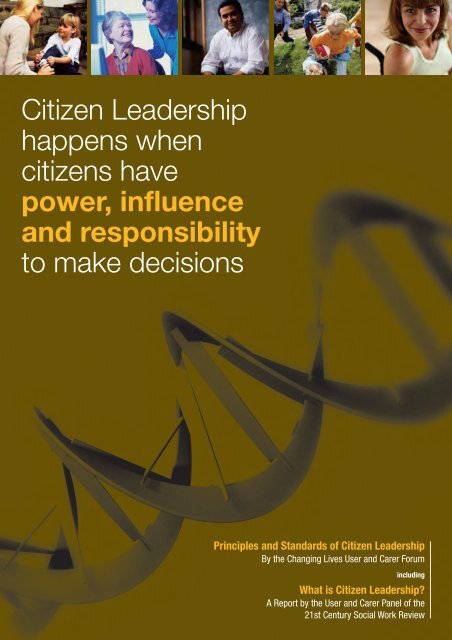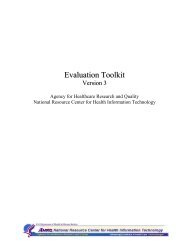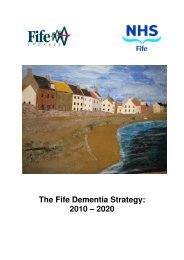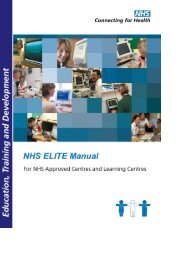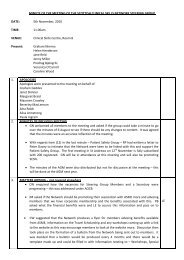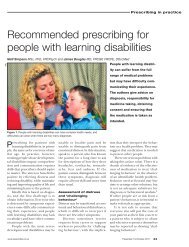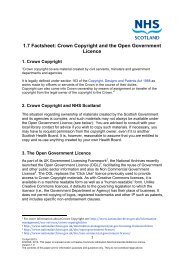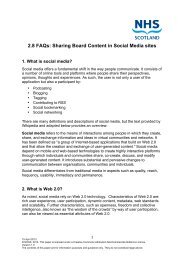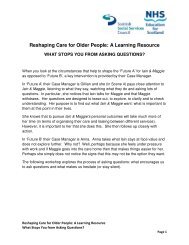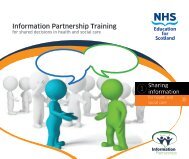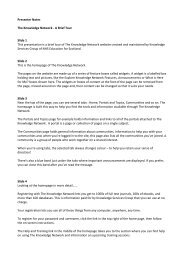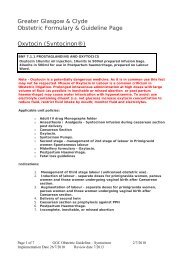Principles and Standards of Citizen Leadership - The Knowledge ...
Principles and Standards of Citizen Leadership - The Knowledge ...
Principles and Standards of Citizen Leadership - The Knowledge ...
You also want an ePaper? Increase the reach of your titles
YUMPU automatically turns print PDFs into web optimized ePapers that Google loves.
<strong>Citizen</strong> <strong>Leadership</strong><br />
happens when<br />
citizens have<br />
power, influence<br />
<strong>and</strong> responsibility<br />
to make decisions<br />
<strong>Principles</strong> <strong>and</strong> St<strong>and</strong>ards <strong>of</strong> <strong>Citizen</strong> <strong>Leadership</strong><br />
By the Changing Lives User <strong>and</strong> Carer Forum<br />
including<br />
What is <strong>Citizen</strong> <strong>Leadership</strong>?<br />
A Report by the User <strong>and</strong> Carer Panel <strong>of</strong> the<br />
21st Century Social Work Review
<strong>Principles</strong> <strong>and</strong> St<strong>and</strong>ards <strong>of</strong> <strong>Citizen</strong> <strong>Leadership</strong><br />
By the Changing Lives User <strong>and</strong> Carer Forum<br />
including<br />
What is <strong>Citizen</strong> <strong>Leadership</strong>?<br />
A Report by the User <strong>and</strong> Carer Panel <strong>of</strong> the<br />
21st Century Social Work Review<br />
<strong>The</strong> Scottish Government, Edinburgh 2008
© Crown copyright 2008<br />
ISBN: 978-0-7559-5712-5<br />
<strong>The</strong> Scottish Government<br />
St Andrew’s House<br />
Edinburgh<br />
EH1 3DG<br />
Produced for the Scottish Government by RR Donnelley B55231 04/08<br />
Published by the Scottish Government, April, 2008
Contents<br />
Foreword<br />
iv<br />
Preface 1<br />
<strong>Principles</strong> <strong>and</strong> St<strong>and</strong>ards <strong>of</strong> <strong>Citizen</strong> <strong>Leadership</strong> 2<br />
1. Potential 6<br />
2. Development 7<br />
3. Early Involvement 8<br />
4. Person-centred 9<br />
5. Information 10<br />
6. Equality 11<br />
7. Control through Partnership 12<br />
8. Wider Benefit 13<br />
What is <strong>Citizen</strong> <strong>Leadership</strong>? 14<br />
1. Introduction 15<br />
2. Why <strong>Citizen</strong> <strong>Leadership</strong>? 16<br />
3. What is <strong>Citizen</strong> <strong>Leadership</strong>? 17<br />
4. Benefits <strong>of</strong> <strong>Citizen</strong> <strong>Leadership</strong> 18<br />
5. Qualities <strong>of</strong> <strong>Leadership</strong> 20<br />
6. Current Examples <strong>of</strong> <strong>Citizen</strong> <strong>Leadership</strong> 22<br />
7. Relationship Between <strong>Leadership</strong> <strong>and</strong> <strong>Citizen</strong> <strong>Leadership</strong> 23<br />
8. Barriers to Effective <strong>Citizen</strong> <strong>Leadership</strong> 24<br />
9. What Needs to be in Place for <strong>Citizen</strong> <strong>Leadership</strong> to Flourish 26<br />
10. Developing <strong>Citizen</strong> <strong>Leadership</strong> 27
Foreword<br />
<strong>The</strong> User <strong>and</strong> Carer Panel that was part <strong>of</strong> the 21st Century Social Work Review produced<br />
the report What is <strong>Citizen</strong> <strong>Leadership</strong>?<br />
<strong>The</strong> User <strong>and</strong> Carer Forum produced <strong>The</strong> <strong>Principles</strong> <strong>and</strong> St<strong>and</strong>ards <strong>of</strong> <strong>Citizen</strong> <strong>Leadership</strong>.<br />
<strong>The</strong> Forum replaced the User <strong>and</strong> Carer Panel, although many <strong>of</strong> the original members<br />
remained. This document went out to consultation <strong>and</strong> the final version includes changes<br />
made as a result <strong>of</strong> comments received.<br />
Both documents reflect the huge amount <strong>of</strong> time <strong>and</strong> energy that the User <strong>and</strong> Carer Panel<br />
<strong>and</strong> the User <strong>and</strong> Carer Forum have spent on this project.<br />
<strong>The</strong> Scottish Consortium for Learning Disability shaped both <strong>of</strong> these documents. We have<br />
facilitated both the User <strong>and</strong> Carer Panel <strong>and</strong> the User <strong>and</strong> Carer Forum since 2004.<br />
<strong>The</strong> illustrations used in <strong>The</strong> <strong>Principles</strong> <strong>and</strong> St<strong>and</strong>ards <strong>of</strong> <strong>Citizen</strong> <strong>Leadership</strong> are by<br />
Clare Hayton. <strong>The</strong> illustrations used in What is <strong>Citizen</strong> <strong>Leadership</strong>? are by Graham Ogilvie.<br />
This publication was funded by Changing Lives.
<strong>Principles</strong> <strong>and</strong> St<strong>and</strong>ards <strong>of</strong> <strong>Citizen</strong> <strong>Leadership</strong> iv:1<br />
CHANGING LIVES: CITIZEN LEADERSHIP<br />
PREFACE<br />
This year will see the publication <strong>of</strong> much <strong>of</strong> the work that has been developed nationally<br />
since Changing Lives, the report <strong>of</strong> the review <strong>of</strong> social work services in Scotl<strong>and</strong>, was<br />
launched in February 2006. I am delighted to be able to introduce one <strong>of</strong> the first <strong>of</strong> those to<br />
you, <strong>Citizen</strong> <strong>Leadership</strong>.<br />
As you may know, the Scottish Government established the User <strong>and</strong> Carer Forum upon<br />
publication <strong>of</strong> Changing Lives, in order to provide an opportunity for service users <strong>and</strong> carers<br />
to directly influence <strong>and</strong> shape the development <strong>and</strong> implementation <strong>of</strong> the Changing Lives<br />
agenda.<br />
<strong>The</strong> Forum was particularly asked to follow up on the idea <strong>of</strong> <strong>Citizen</strong> <strong>Leadership</strong> <strong>and</strong> has<br />
developed a set <strong>of</strong> principles, with suggested st<strong>and</strong>ards <strong>and</strong> indicators to help demonstrate<br />
how these can apply, by which the leadership contribution <strong>of</strong> those who use services can be<br />
guided <strong>and</strong> supported.<br />
I have been asked to write the preface as chair <strong>of</strong> the Practice Governance Change<br />
Programme <strong>and</strong> I am very pleased to do so. While this work has been developed by, <strong>and</strong><br />
properly belongs to the User <strong>and</strong> Carer Forum, the drafts have been consulted upon widely<br />
<strong>and</strong> enjoys the endorsement the Changing Lives Programme, providing an important<br />
contribution to building the capacity for delivering personalised services. <strong>The</strong> Scottish<br />
Government is also sponsoring a pilot training programme to support implementation <strong>and</strong> the<br />
development <strong>of</strong> a toolkit. This will include users <strong>and</strong> carers <strong>and</strong> practitioners, to ensure that<br />
there is a real impact on practice.<br />
<strong>The</strong> phrase <strong>Citizen</strong> <strong>Leadership</strong> has been carefully chosen to reflect a belief that this work is<br />
about more than advocacy <strong>and</strong> that those involved are not simply current users <strong>of</strong> services.<br />
<strong>The</strong> clear intention is to ensure that people in Scotl<strong>and</strong> are enabled to have more control over<br />
their lives <strong>and</strong> the services which support them <strong>and</strong> on behalf <strong>of</strong> the Practice Governance<br />
Change Programme I commend this to you.<br />
Andrew Lowe<br />
Chair<br />
Practice Governance Change Programme<br />
Changing Lives<br />
March 2008
We are a voice for<br />
people who use<br />
services <strong>and</strong> carers.<br />
We share our collective<br />
experiences.<br />
<strong>Principles</strong> <strong>and</strong> St<strong>and</strong>ards <strong>of</strong> <strong>Citizen</strong> <strong>Leadership</strong><br />
By the Changing Lives User <strong>and</strong> Carer Forum
<strong>Principles</strong> <strong>and</strong> St<strong>and</strong>ards <strong>of</strong> <strong>Citizen</strong> <strong>Leadership</strong> 2:3<br />
Background to this Document<br />
<strong>The</strong> User <strong>and</strong> Carer Forum began to meet in September 2006. <strong>The</strong> Forum is supporting the<br />
implementation <strong>of</strong> Changing Lives: the report <strong>of</strong> the 21st Century Social Work Review. <strong>The</strong><br />
Forum is made up <strong>of</strong> members from the User <strong>and</strong> Carer Panel that worked on the Review <strong>and</strong><br />
new members from a wide range <strong>of</strong> backgrounds <strong>and</strong> experiences.<br />
Who we are<br />
We are a group <strong>of</strong> people, some <strong>of</strong> us use services <strong>and</strong> some <strong>of</strong> us are carers. On the Forum we<br />
represent ourselves <strong>and</strong> not the organisations we work with. At the moment there are 12 <strong>of</strong> us.<br />
Some words or phrases we would use to describe the Forum are “expert; passionate;<br />
accessible; togetherness; empathy; growing in confidence; unique; from service user or carer to<br />
<strong>Citizen</strong> Leader”.<br />
We are from all over Scotl<strong>and</strong> <strong>and</strong> have a variety <strong>of</strong> backgrounds <strong>and</strong> experiences; these include<br />
autism spectrum disorder, caring, criminal justice system, drug <strong>and</strong> alcohol addiction, dementia,<br />
homelessness, learning disability, mental health issues, physical disability, as well as the LGBT<br />
(lesbian, gay, bisexual, transgender) <strong>and</strong> ethnic communities.<br />
“<strong>The</strong> reason why I want to be on this Forum is in the hope we can help with ideas<br />
<strong>and</strong> actions so that users, carers <strong>and</strong> providers do not have to wait in vain for the<br />
spirit <strong>of</strong> the agenda set out in Changing Lives to influence the delivery <strong>of</strong> improved<br />
services.”<br />
Isabel<br />
Our work<br />
We are a voice for people who use services <strong>and</strong> carers. We share our collective experiences.<br />
One <strong>of</strong> our main aims is to develop <strong>Citizen</strong> <strong>Leadership</strong> – something that the User <strong>and</strong> Carer<br />
Panel had thought <strong>of</strong> during the 21st Century Social Work Review. <strong>Citizen</strong> <strong>Leadership</strong> is an<br />
activity that happens when citizens have power <strong>and</strong> influence <strong>and</strong> responsibility to make<br />
decisions. <strong>Citizen</strong> leadership happens when individuals have some control over their own<br />
services. It also happens when citizens take action for the benefit <strong>of</strong> other citizens.
<strong>Principles</strong> <strong>and</strong> St<strong>and</strong>ards <strong>of</strong> <strong>Citizen</strong> <strong>Leadership</strong><br />
<strong>The</strong> User <strong>and</strong> Carer Panel came up with the idea <strong>of</strong> <strong>Citizen</strong> <strong>Leadership</strong> during the course <strong>of</strong> its<br />
work for the Review in 2005 <strong>and</strong> this was included in Changing Lives.<br />
<strong>The</strong> Forum has taken forward the work <strong>of</strong> the Panel in their meetings so far <strong>and</strong> has been<br />
developing <strong>Principles</strong>, St<strong>and</strong>ards <strong>and</strong> Indicators <strong>of</strong> <strong>Citizen</strong> <strong>Leadership</strong>. As part <strong>of</strong> their work to<br />
create them they looked at the other st<strong>and</strong>ards like the National St<strong>and</strong>ards for Community<br />
Engagement.<br />
<strong>The</strong>re are some jargon words in this document. This is what we mean by them:<br />
> A Principle is the way things should be done<br />
> A St<strong>and</strong>ard is what we expect to see happen<br />
> An Indicator is an example <strong>of</strong> it happening.<br />
<strong>The</strong> general idea that citizens should have more opportunities to develop <strong>and</strong> express their<br />
leadership skills, should apply in all walks <strong>of</strong> life. However, when the User <strong>and</strong> Carer Forum was<br />
thinking about this subject, they were thinking about situations where people were receiving<br />
social services. So some <strong>of</strong> the statements made about social workers or social care workers<br />
might also apply to, say, health pr<strong>of</strong>essionals.
<strong>Principles</strong> <strong>and</strong> St<strong>and</strong>ards <strong>of</strong> <strong>Citizen</strong> <strong>Leadership</strong> 4:5<br />
<strong>Principles</strong> <strong>of</strong> <strong>Citizen</strong> <strong>Leadership</strong><br />
A Definition. What is <strong>Citizen</strong> <strong>Leadership</strong>?<br />
“<strong>Citizen</strong> <strong>Leadership</strong> is an activity… it happens when citizens have power <strong>and</strong> influence <strong>and</strong><br />
responsibility to make decisions. <strong>Citizen</strong> <strong>Leadership</strong> happens when individuals have some<br />
control over their own services. It also happens when citizens take action for the benefit <strong>of</strong> other<br />
citizens.”<br />
People who use services <strong>and</strong> carers are citizens. This means they should have rights <strong>and</strong><br />
responsibilities in their communities. <strong>The</strong>y should:<br />
> have a say<br />
> get information<br />
> take part in decisions<br />
> make things happen.<br />
A leader influences <strong>and</strong> enables others to make a contribution <strong>and</strong> so helps to make it happen.<br />
1. Potential<br />
Everyone should have their leadership potential recognised.<br />
2. Development<br />
People’s leadership potential can only be fulfilled through opportunities for development.<br />
3. Early Involvement<br />
People who use services <strong>and</strong> carers must be involved at all stages <strong>of</strong> developing <strong>and</strong><br />
delivering services.<br />
4. Person-centred<br />
Everyone is an individual <strong>and</strong> should be helped to show leadership in the way that suits<br />
them best.<br />
5. Information<br />
People need information that is clear to them <strong>and</strong> they need it in plenty <strong>of</strong> time.<br />
6. Equality<br />
People use their leadership skills to challenge inequality in services <strong>and</strong> wider society.<br />
7. Control through Partnership<br />
<strong>Citizen</strong> <strong>Leadership</strong> enables people to have more control over their own services, through<br />
working in partnership with those services.<br />
8. Wider Benefit<br />
<strong>Citizen</strong> <strong>Leadership</strong> is for the benefit <strong>of</strong> other people who use services as well as yourself.
1<br />
Principle 1 - Potential<br />
Everyone should have their leadership<br />
potential recognised.<br />
St<strong>and</strong>ards<br />
> <strong>The</strong>re is the assumption that everyone has leadership potential.<br />
> All people who use services <strong>and</strong> carers are encouraged to take more responsibility.<br />
> Everyone is <strong>of</strong>fered opportunities to show leadership.<br />
Indicators<br />
> Assessments identify people’s gifts, skills <strong>and</strong> capacities, <strong>and</strong> not just their needs.<br />
> People who use services <strong>and</strong> carers have opportunities to express their views <strong>and</strong> those <strong>of</strong><br />
others.<br />
> People are encouraged to take responsibility at a time when they can do so.
2<br />
<strong>Principles</strong> <strong>and</strong> St<strong>and</strong>ards <strong>of</strong> <strong>Citizen</strong> <strong>Leadership</strong> 6:7<br />
Principle 2 - Development<br />
People’s leadership potential can only be<br />
fulfilled through opportunities for<br />
development.<br />
St<strong>and</strong>ards<br />
> People who use services <strong>and</strong> staff have a safe environment to develop <strong>Citizen</strong> <strong>Leadership</strong>.<br />
> Clear information is provided on the development <strong>of</strong> <strong>Citizen</strong> <strong>Leadership</strong>.<br />
> Sufficient resources are provided for the development <strong>of</strong> <strong>Citizen</strong> <strong>Leadership</strong>.<br />
Indicators<br />
> People who use services <strong>and</strong> carers underst<strong>and</strong> leadership.<br />
> Pr<strong>of</strong>essional staff support <strong>and</strong> encourage the development <strong>of</strong> <strong>Citizen</strong> <strong>Leadership</strong>.<br />
> People who use services <strong>and</strong> carers are fully aware <strong>of</strong> their rights <strong>and</strong> responsibilities.<br />
> People who use services <strong>and</strong> carers receive training on developing <strong>Citizen</strong> <strong>Leadership</strong>.<br />
> Clear st<strong>and</strong>ards for development are in place.<br />
> <strong>The</strong>re is a drive from the top for services to encourage the development <strong>of</strong> <strong>Citizen</strong><br />
<strong>Leadership</strong>.<br />
> Pr<strong>of</strong>essional staff receive training on developing <strong>Citizen</strong> <strong>Leadership</strong>.<br />
> <strong>The</strong> rights <strong>of</strong> people who use services <strong>and</strong> carers are fully recognised in their personal<br />
plans.<br />
> <strong>Citizen</strong> Leaders act as mentors <strong>and</strong> share experiences.<br />
> People show leadership skills that they did not have before.<br />
> People who use services <strong>and</strong> carers have the opportunity to practise <strong>Citizen</strong> <strong>Leadership</strong>.<br />
> People who have refused services in the past are given support <strong>and</strong> encouragement to<br />
develop leadership skills.<br />
> People who have had little opportunity to take responsibility, now have opportunities to<br />
learn to take responsibility for themselves <strong>and</strong> others.
3<br />
Principle 3 - Early Involvement<br />
People who use services <strong>and</strong> carers must be<br />
involved at all stages <strong>of</strong> developing <strong>and</strong><br />
delivering services.<br />
St<strong>and</strong>ards<br />
> People who use services <strong>and</strong> carers are involved in setting the agenda for service<br />
development.<br />
> People who use services <strong>and</strong> carers are asked for their views about service developments.<br />
Indicators<br />
> <strong>The</strong>re are open meetings between service users, carers <strong>and</strong> social workers.<br />
> People who use services <strong>and</strong> carers are involved in meetings to plan new services.<br />
> Local panels <strong>of</strong> people who use services <strong>and</strong> family carers are set up to give their views on<br />
service development.<br />
> People who use services <strong>and</strong> carers are able to make suggestions at community venues<br />
<strong>and</strong>/or other places that are comfortable <strong>and</strong> easy to get to.<br />
> People who use services <strong>and</strong> carers have the confidence to challenge service<br />
pr<strong>of</strong>essionals.<br />
> People who use services <strong>and</strong> carers make positive suggestions about developing services.<br />
> Services show improvement.
4<br />
<strong>Principles</strong> <strong>and</strong> St<strong>and</strong>ards <strong>of</strong> <strong>Citizen</strong> <strong>Leadership</strong> 8:9<br />
Principle 4 - Person-centred<br />
Everyone is an individual <strong>and</strong> should be<br />
helped to show leadership in the way that<br />
suits them best.<br />
St<strong>and</strong>ards<br />
> People who use services <strong>and</strong> carers get the right support to be actively involved in a<br />
leadership role, including independent advocacy.<br />
> People who use services <strong>and</strong> carers have the opportunity to show their leadership qualities<br />
in different ways.<br />
> Everyone should be assumed to have leadership potential.<br />
> People who are unable at any time to exercise responsibility <strong>and</strong> leadership (e.g. because<br />
<strong>of</strong> illness) should be supported <strong>and</strong> encouraged to develop responsibility for themselves<br />
<strong>and</strong> others at a later time.<br />
Indicators<br />
> Independent advocacy resources are available locally to people that want to use them.<br />
> Social work services staff underst<strong>and</strong> the various ways that people can show leadership.<br />
> Communication aids <strong>and</strong> other technology are provided where they are needed to allow<br />
people to take on leadership roles.<br />
> Meetings take full account <strong>of</strong> participants’ different communication needs.<br />
> Where people have individual support plans, these show how people have been supported<br />
to make choices <strong>and</strong> show leadership.<br />
> People who use services <strong>and</strong> carers are getting the service they want.<br />
> Choice <strong>and</strong> options are <strong>of</strong>fered.<br />
> Access to advocacy is available before a crisis develops.<br />
> Support is available early to prevent a person’s situation getting worse.<br />
> No one should miss out on support just because they are alone or ill.<br />
> <strong>The</strong>re is continuity <strong>of</strong> support so people can become stronger <strong>and</strong> deal with changes <strong>and</strong><br />
difficulties.<br />
> When people are finding it hard to take responsibility for themselves they are <strong>of</strong>fered<br />
support that is right for them e.g. advocacy <strong>and</strong> peer support.
5<br />
Principle 5 - Information<br />
People need information that is clear to<br />
them <strong>and</strong> they need it in plenty <strong>of</strong> time.<br />
St<strong>and</strong>ards<br />
> People who use services <strong>and</strong> carers get clear accessible information so that they can<br />
make the most <strong>of</strong> their opportunities to show leadership.<br />
Indicators<br />
> People who use services <strong>and</strong> carers are getting information, advocacy <strong>and</strong> other available<br />
services.<br />
> <strong>The</strong>re is sharing <strong>of</strong> information between peers <strong>and</strong> through informal networks.<br />
> Relevant documents are available in different formats.<br />
> Regular information from social work departments goes to people who use services <strong>and</strong><br />
carers (in different languages <strong>and</strong> formats).
6<br />
<strong>Principles</strong> <strong>and</strong> St<strong>and</strong>ards <strong>of</strong> <strong>Citizen</strong> <strong>Leadership</strong> 10:11<br />
Principle 6 - Equality<br />
People use their leadership skills to<br />
challenge inequality in services <strong>and</strong> wider<br />
society.<br />
St<strong>and</strong>ards<br />
> People who use services <strong>and</strong> family carers have access to advocacy.<br />
> Organisations respond positively to challenges by people who use services <strong>and</strong> carers.<br />
Indicators<br />
> Independent advocacy resources are available locally to people that want to use them.<br />
> Organisations have mechanisms in place that allow service users <strong>and</strong> carers to make<br />
positive suggestions for change.<br />
> People who use services <strong>and</strong> carers get responses to questions or challenges.<br />
> Campaigns led by people who use services <strong>and</strong>/or family carers have brought about<br />
changes.
7<br />
Principle 7 - Control through Partnership<br />
<strong>Citizen</strong> <strong>Leadership</strong> enables people to have<br />
more control over their own lives <strong>and</strong><br />
services, through working in partnership<br />
with those services.<br />
St<strong>and</strong>ards<br />
> People have a significant say in the assessment, planning <strong>and</strong> delivery <strong>of</strong> their own<br />
services.<br />
> Funding is flexible.<br />
> Person-centred planning is the normal way to plan services.<br />
> People have the support they need to overcome the problems <strong>and</strong> issues that are<br />
preventing them from taking more control over their lives.<br />
Indicators<br />
> People choose their service provider.<br />
> People who use services are able to change their social worker.<br />
> People who are entitled to direct payments must have access to them.<br />
> People who use services are involved in recruiting social workers <strong>and</strong> support staff.<br />
> Contracts exist between paid carers <strong>and</strong> service users.<br />
> Services are improving.<br />
> <strong>The</strong>re is effective communication <strong>and</strong> good relationships between the social worker <strong>and</strong><br />
the person who uses services <strong>and</strong> carer.<br />
> People who use services <strong>and</strong> carers have increased opportunities to develop skills <strong>and</strong><br />
lead the lives <strong>of</strong> their choosing.
8<br />
<strong>Principles</strong> <strong>and</strong> St<strong>and</strong>ards <strong>of</strong> <strong>Citizen</strong> <strong>Leadership</strong> 12:13<br />
Principle 8 - Wider Benefit<br />
<strong>Citizen</strong> <strong>Leadership</strong> is for the benefit <strong>of</strong> other<br />
people who use services as well as<br />
yourself.<br />
St<strong>and</strong>ards<br />
> People who use services <strong>and</strong> carers are involved in service development <strong>and</strong>/or strategic<br />
development.<br />
> <strong>The</strong>re are mechanisms for good practice to be shared from one individual’s situation to<br />
another.<br />
> People who use services <strong>and</strong> family carers are involved in training <strong>of</strong> social workers <strong>and</strong><br />
other pr<strong>of</strong>essional staff.<br />
> People who use services <strong>and</strong> carers are able to support each other <strong>and</strong> to support family,<br />
friends <strong>and</strong> neighbours. Services do not get in the way <strong>of</strong> this.<br />
Indicators<br />
> People have access to a Local Area Co-ordinator.<br />
> <strong>Citizen</strong> Leaders publicise issues.<br />
> <strong>The</strong>re is evidence <strong>of</strong> people who use services <strong>and</strong> carers campaigning.<br />
> People who use services <strong>and</strong> family carers influence policy change.<br />
> People do not only have connections with services but are in touch with family, friends <strong>and</strong><br />
neighbours.
People who use services<br />
<strong>and</strong> family carers should<br />
be involved as leaders in the<br />
planning, development <strong>and</strong><br />
monitoring <strong>of</strong> services<br />
What is <strong>Citizen</strong> <strong>Leadership</strong>?<br />
A report by the User <strong>and</strong> Carer Panel <strong>of</strong> the<br />
21st Century Social Work review
1<br />
<strong>Principles</strong> <strong>and</strong> St<strong>and</strong>ards <strong>of</strong> <strong>Citizen</strong> <strong>Leadership</strong> 14:15<br />
Introduction<br />
<strong>The</strong> 21st Century Social Work Review recognises that the development <strong>of</strong> strong leadership is<br />
needed to bring about the changes that it recommends. <strong>The</strong> Review says that frontline social<br />
workers should have leadership qualities as well as senior <strong>and</strong> middle managers <strong>and</strong> should<br />
be given the opportunities to show leadership in their work.<br />
It also says that <strong>Citizen</strong> <strong>Leadership</strong> can help transform services. People who use services <strong>and</strong><br />
family carers should be involved as leaders in the planning, development, <strong>and</strong> monitoring <strong>of</strong><br />
services. <strong>The</strong>y should play key roles in who becomes a social worker <strong>and</strong> what they learn. To<br />
do this, these citizens need to have the chance to develop leadership skills.<br />
<strong>Citizen</strong> <strong>Leadership</strong> is more than “user involvement”. Effective consultation needs to take place<br />
but <strong>Citizen</strong> <strong>Leadership</strong> is something more. User involvement does not require any shift in<br />
power. <strong>Citizen</strong> <strong>Leadership</strong> does require a shift in power: it is a new relationship between policy<br />
makers/service planners/service providers <strong>and</strong> people who use services/family carers. In this<br />
new relationship, citizens move from being “service users” to leaders. <strong>The</strong>y take on a shared<br />
responsibility for ensuring that the right services are available for themselves <strong>and</strong> others.<br />
This new partnership does not just work at the level <strong>of</strong> policy making. At an individual level<br />
too, people will have more control <strong>of</strong> the services they use.<br />
As a result, services become planned <strong>and</strong> delivered in a way that focuses on achieving things<br />
that will make a difference to people’s lives.<br />
<strong>Citizen</strong> <strong>Leadership</strong> requires a shift in power<br />
<strong>Citizen</strong> <strong>Leadership</strong><br />
Together . .<br />
PULL!!<br />
Together . .<br />
PULL!!
2<br />
Why <strong>Citizen</strong> <strong>Leadership</strong>?<br />
It has been recognised for a while that people who use social work services <strong>and</strong> family carers,<br />
should be involved in shaping the services they receive. We are the experts when it comes to<br />
knowing how services affect people’s lives. It is important that we should be able to show<br />
leadership in shaping services so that we can use this expertise effectively.<br />
Services should give us the support to live the lives we want to live. If we, as citizens, have<br />
more say over the services we receive, there is more chance that those services will be right<br />
for us. When this happens they will be more likely to produce the outcomes that we are<br />
looking for.<br />
Services see everyone as a unique individual<br />
graham@ogilviedesign.co.uk<br />
I AM<br />
ME!!!<br />
At the Heart<br />
<strong>of</strong> EVERYTHING!
3<br />
What is <strong>Citizen</strong> <strong>Leadership</strong>?<br />
<strong>Principles</strong> <strong>and</strong> St<strong>and</strong>ards <strong>of</strong> <strong>Citizen</strong> <strong>Leadership</strong> 16:17<br />
<strong>Citizen</strong> <strong>Leadership</strong> is about people being able to speak out <strong>and</strong> shape services for individual<br />
benefit <strong>and</strong> for the general good. Here is an example <strong>of</strong> <strong>Citizen</strong> <strong>Leadership</strong> in practice:<br />
<strong>The</strong> Scottish Executive wanted people who used Social Work Services to play a big<br />
part in the 21st Century Social Work Review. A panel <strong>of</strong> people who used services or<br />
were family carers were recruited. <strong>The</strong>y met <strong>of</strong>ten for about a year to share their<br />
experiences <strong>and</strong> discuss their views. <strong>The</strong>y considered all the main themes <strong>of</strong> the<br />
Review <strong>and</strong> passed their views on to the Review Group.<br />
Many <strong>of</strong> the changes that the panel wanted to see have become recommendations in<br />
the final Report “Changing Lives”. <strong>The</strong> Panel influenced the Review Group’s thinking<br />
<strong>and</strong> influenced the final Report. <strong>The</strong> Review Group found that the Panel were very<br />
effective at using their personal experiences to inform their thinking about services in<br />
general.<br />
This is an example <strong>of</strong> <strong>Citizen</strong> <strong>Leadership</strong> because:<br />
> People who used services influenced services at a policy level<br />
> <strong>The</strong>y were involved in the process at an early stage<br />
> <strong>The</strong> pr<strong>of</strong>essionals involved gave the Panel a certain amount <strong>of</strong> power<br />
> <strong>The</strong> Panel had the leadership skills to communicate what they wanted to say<br />
> <strong>The</strong>y also had the chance to develop new skills <strong>and</strong> confidence along the way –<br />
attributes that they can use in other situations.<br />
<strong>Citizen</strong> <strong>Leadership</strong> is both a quality that people have <strong>and</strong> an activity that people do. It is a<br />
personal quality that people <strong>of</strong>ten develop in groups <strong>and</strong> it is seen through activities such as<br />
problem-solving <strong>and</strong> working for change.<br />
It is not just about influencing policy. It is also about individuals showing leadership.<br />
M has had a lot <strong>of</strong> experience <strong>of</strong> using services. She has also become assertive <strong>and</strong> clear<br />
about what she wants. She is recognised <strong>and</strong> respected by the many people who know her.<br />
V came to see M because she wanted help but was afraid to go to the Social Work<br />
Department. She was worried that Social Workers would put her children into care. M<br />
was able to give her reliable information about what services were available. She was<br />
able to discuss the pros <strong>and</strong> cons <strong>of</strong> going to the Social Work Department. And she<br />
was able to link V in with a collective advocacy organisation.<br />
<strong>Citizen</strong> <strong>Leadership</strong> can be seen in many walks <strong>of</strong> life. Trade Unions, tenants associations <strong>and</strong><br />
grassroots campaigns are three places where you would expect to see it. In this report, we<br />
are thinking about how citizens, as opposed to pr<strong>of</strong>essionals who work in social work<br />
services, can take on leadership roles to influence services. Later on in the report, we talk<br />
about how pr<strong>of</strong>essionals can support <strong>Citizen</strong> <strong>Leadership</strong>.
4<br />
Benefits <strong>of</strong> <strong>Citizen</strong> <strong>Leadership</strong><br />
When people who use services <strong>and</strong> family carers become leaders in the way that we have<br />
described, there are a number <strong>of</strong> benefits that result.<br />
First, an improvement in the quality <strong>of</strong> services can be expected. Many <strong>of</strong> the<br />
recommendations in the 21st Century Social Work Review will require services to be<br />
re-designed. Involving <strong>Citizen</strong> Leaders in planning these services will lead to better services<br />
because people with personal experience <strong>of</strong> using services will be directly influencing the<br />
shape <strong>of</strong> new services. <strong>Citizen</strong> <strong>Leadership</strong> provides that link between service planning <strong>and</strong><br />
service use.<br />
A better match between people <strong>and</strong> their services<br />
‘Matching’ Social Workers<br />
I have<br />
specific skills<br />
You won't<br />
fit with me!<br />
You'll fit<br />
with me!<br />
graham@ogilviedesign.co.uk
<strong>Principles</strong> <strong>and</strong> St<strong>and</strong>ards <strong>of</strong> <strong>Citizen</strong> <strong>Leadership</strong> 18:19<br />
Secondly, there is an economic benefit. It is more likely to be a cost-efficient process when<br />
people take more responsibility for assessing their own needs, planning <strong>and</strong> choosing<br />
services to meet those needs. It is even more likely to save money when they develop the<br />
skills to solve problems <strong>and</strong> take decisions about the bigger issues in their lives such as<br />
where to live, who to live with, changing a service that no longer suits.<br />
Thirdly, people will be less dependent on services. People who develop leadership skills <strong>of</strong><br />
assertiveness <strong>and</strong> problem-solving, motivation <strong>and</strong> delegation, are likely to use services as a<br />
means to leading the life they want to live, instead <strong>of</strong> becoming dependent on them.<br />
Services that will stop a crisis happening<br />
Services . . . !<br />
Let's prevent a<br />
Crisis BEFORE<br />
it happens!<br />
graham@ogilviedesign.co.uk
5<br />
Qualities <strong>of</strong> <strong>Leadership</strong><br />
<strong>The</strong> qualities <strong>of</strong> <strong>Citizen</strong> Leaders are the same as the qualities that the best leaders in<br />
pr<strong>of</strong>essional <strong>and</strong> business settings possess.<br />
Here are some key qualities that good <strong>Citizen</strong> Leaders possess, with some examples <strong>of</strong><br />
where we know this leadership is already shown.<br />
Challenge the process<br />
This means being prepared to ask “Why are things done this way?” It means being prepared<br />
to take risks to achieve a better result.<br />
Example: <strong>The</strong> User <strong>and</strong> Carer Panel <strong>of</strong> the 21st Century Social Work Review has<br />
questioned a number <strong>of</strong> social work practices <strong>and</strong> suggested different ways things<br />
could be done.<br />
Example: Someone asks to change their respite service from a traditional service<br />
based in a building, to a flexible service that is new <strong>and</strong> experimental.<br />
Example: Turning down an unacceptable service at the risk <strong>of</strong> not being <strong>of</strong>fered an<br />
alternative.<br />
Inspire a shared vision<br />
This means having a vision for the future, being able to communicate this to other people <strong>and</strong><br />
getting them to work towards achieving the same vision.<br />
Example: People First, a collective advocacy organisation, had a vision <strong>of</strong> all long-stay<br />
learning disability hospitals closing. <strong>The</strong>y put a lot <strong>of</strong> energy into convincing other<br />
people this was the right way to go.<br />
Enable others to act<br />
This part <strong>of</strong> leadership means allowing or supporting other people to be able take on more<br />
responsibility. This can be seen when someone who uses services encourages another to<br />
speak up.<br />
Also, because people have been relatively powerless, there are many examples <strong>of</strong> leadership<br />
through collective action.<br />
Example: Carers campaigning to keep lunch clubs open.
<strong>Principles</strong> <strong>and</strong> St<strong>and</strong>ards <strong>of</strong> <strong>Citizen</strong> <strong>Leadership</strong> 20:21<br />
Model the way<br />
This means influencing other people by the way you live, speak <strong>and</strong> act. It means leading by<br />
example.<br />
Example: Peer support groups where people treat each other in a respectful way.<br />
Example: <strong>Citizen</strong>s being involved in the training <strong>and</strong> development <strong>of</strong> pr<strong>of</strong>essionals.<br />
Encourage the spirit<br />
This means showing an active <strong>and</strong> sincere concern for others in the organisation. A good<br />
<strong>Citizen</strong> Leader will be giving positive feedback to both sides – for example, being part <strong>of</strong> a<br />
local government monitoring group <strong>and</strong> saying when services are working.<br />
Example: <strong>The</strong> way people work with their social worker, being clear about what they<br />
want <strong>and</strong> praising them when they do a good job, shows good leadership.
6<br />
Current Examples <strong>of</strong> <strong>Citizen</strong> <strong>Leadership</strong><br />
We have given a few examples above <strong>of</strong> <strong>Citizen</strong> <strong>Leadership</strong>. Here are a few more examples <strong>of</strong><br />
where we see <strong>Citizen</strong> <strong>Leadership</strong> already happening:<br />
> <strong>The</strong> Changing Lives User <strong>and</strong> Carer Forum<br />
> People First, HUG (Highl<strong>and</strong> User Group) <strong>and</strong> other collective advocacy organisations<br />
> Training Social Workers <strong>and</strong> Social Work students (Scottish Voices)<br />
> Young Carers training hospital staff<br />
> People recruiting their own support staff<br />
> Community Care Forums<br />
> Volunteer organisations<br />
> People claiming a Direct Payment<br />
> <strong>Citizen</strong> Advocacy, where people who use services are supported by other citizens to say<br />
what they want to say
7<br />
<strong>Principles</strong> <strong>and</strong> St<strong>and</strong>ards <strong>of</strong> <strong>Citizen</strong> <strong>Leadership</strong> 22:23<br />
Relationship Between Pr<strong>of</strong>essional <strong>Leadership</strong> <strong>and</strong> <strong>Citizen</strong> <strong>Leadership</strong><br />
<strong>The</strong>re is no question <strong>of</strong> <strong>Citizen</strong> <strong>Leadership</strong> replacing pr<strong>of</strong>essional leadership. <strong>The</strong>re will always<br />
be a need for strong leadership at the top <strong>of</strong> Social Work Departments <strong>and</strong> other agencies, all<br />
the way through to frontline workers.<br />
<strong>The</strong> Report <strong>of</strong> the 21st Century Social Work Review <strong>of</strong> Changing Lives, recommends<br />
developing the leadership <strong>of</strong> frontline workers. We think there are similarities with the<br />
development <strong>of</strong> <strong>Citizen</strong> <strong>Leadership</strong>. Frontline workers are not going to become bosses but<br />
they should be able to show more leadership. That means taking more responsibility, showing<br />
integrity <strong>and</strong> being prepared to assert yourself. People who use services <strong>and</strong> family carers are<br />
citizens who should be able to show the same sort <strong>of</strong> leadership. If everyone took more<br />
responsibility to act like a leader, services would be much better.<br />
I want my staff to spend more time with me <strong>and</strong> less time in the <strong>of</strong>fice<br />
Empowered Social Workers!!<br />
I can cut<br />
through this!<br />
graham@ogilviedesign.co.uk
8<br />
Barriers to Effective <strong>Citizen</strong> <strong>Leadership</strong><br />
<strong>The</strong>re are a number <strong>of</strong> reasons why more citizens do not show more effective leadership.<br />
<strong>The</strong>se include:<br />
> Lack <strong>of</strong> power<br />
> Lack <strong>of</strong> experience<br />
> Token involvement<br />
> Lack <strong>of</strong> information<br />
> Lack <strong>of</strong> investment.<br />
Lack <strong>of</strong> power<br />
In business, leadership is <strong>of</strong>ten associated with management, especially senior management.<br />
This is because managers have more say than workers. Frontline workers will only be able to<br />
show leadership if they are encouraged <strong>and</strong> enabled to do so.<br />
In the same way, citizens need to be encouraged <strong>and</strong> enabled to become effective <strong>Citizen</strong><br />
Leaders. Unless there is more <strong>of</strong> a shift in power from pr<strong>of</strong>essionals towards people who use<br />
services <strong>and</strong> family carers, our ability to show leadership will be limited.<br />
<strong>The</strong> User <strong>and</strong> Carer Panel is an example <strong>of</strong> good partnership working. <strong>The</strong> Panel felt that we<br />
were listened to <strong>and</strong> were able to influence the final report. Even so, we did not have the final<br />
say, either about the report or about the process. Also, we knew that we were not involved by<br />
right but because some people in the Scottish Executive were committed to the idea.<br />
Lack <strong>of</strong> experience<br />
Lack <strong>of</strong> experience is a second barrier. Many people have the experience <strong>of</strong> being assessed<br />
<strong>and</strong> then given services with little or no say. Without any opportunity to practise leadership<br />
skills, people cannot develop expertise.<br />
In addition, many people who use services have little self-confidence <strong>and</strong> low self-esteem. It<br />
may be that all their lives people have told them “No, you can’t. You’re not able”. It is even<br />
harder to develop leadership skills if this is your starting <strong>of</strong>f point. People who want to develop<br />
leadership skills need to have different opportunities to do this. This means both formal<br />
opportunities like training courses <strong>and</strong> informal opportunities such as joining an advocacy<br />
group.
<strong>Principles</strong> <strong>and</strong> St<strong>and</strong>ards <strong>of</strong> <strong>Citizen</strong> <strong>Leadership</strong> 24:25<br />
Token involvement<br />
More <strong>and</strong> more, people that use services are being asked to get involved in planning their<br />
own services or having a say in local services. But we think that a lot <strong>of</strong> that involvement is<br />
tokenistic. One “service user” in a room full <strong>of</strong> pr<strong>of</strong>essionals is not likely to change anything.<br />
Sometimes these groups are badly facilitated <strong>and</strong> that stops citizens being able to make a<br />
contribution. Having to read papers written in pr<strong>of</strong>essional language means we <strong>of</strong>ten can’t<br />
contribute. This “involvement” is actually a barrier to <strong>Citizen</strong> <strong>Leadership</strong> because some<br />
pr<strong>of</strong>essionals may honestly believe that they are doing all they need to do.<br />
Lack <strong>of</strong> information<br />
<strong>The</strong>re are many reasons why people who use services <strong>and</strong> indeed carers, do not get all the<br />
information that would make it possible for them to get a full picture. But without good reliable<br />
information, anyone would struggle to be an effective leader. <strong>Citizen</strong>s are no different.<br />
Lack <strong>of</strong> investment<br />
We believe that leadership development is possible but that takes money. Companies invest a<br />
lot in developing leadership qualities in their upper <strong>and</strong> middle management. If we are serious<br />
about <strong>Citizen</strong> <strong>Leadership</strong> making a difference to how services are delivered, we have to invest<br />
in capacity building, training, etc., <strong>and</strong> also in supporting the ongoing practice <strong>of</strong> <strong>Citizen</strong><br />
<strong>Leadership</strong>.
9<br />
What Needs to be in Place for <strong>Citizen</strong> <strong>Leadership</strong> to Flourish<br />
It is true that <strong>Citizen</strong> <strong>Leadership</strong> will exist in places without any encouragement at all.<br />
However, many more people have the potential to become leaders with the right<br />
opportunities to develop. Even born leaders need the right environment for their leadership to<br />
be effective.<br />
For individuals to develop their leadership potential <strong>and</strong> to give as many people as possible<br />
this opportunity, the following factors need to be in place:<br />
1) agencies that commission <strong>and</strong> provide services recognise the leadership role that service<br />
users <strong>and</strong> family carers can play<br />
2) these agencies make sure that the way they work gives these citizens the power to show<br />
their leadership qualities<br />
3) people have the opportunity to join peer groups where they can develop their leadership<br />
skills safely, e.g. collective advocacy groups<br />
4) people have the opportunity to take on leadership roles in different ways:<br />
> at an individual level this might mean accessing a Direct Payment or recruiting their<br />
own support staff<br />
> at an operational level it might mean training social work students<br />
> at a strategic level it might mean being heavily involved in a local authority’s plans to<br />
implement the recommendations <strong>of</strong> the 21st Century Social Work Review<br />
5) people get the right support to be actively involved in a leadership role, including<br />
independent advocacy<br />
6) there is investment in developing the leadership skills <strong>of</strong> a significant number <strong>of</strong> people<br />
who use services <strong>and</strong> family carers. This will enable them to take on major leadership roles<br />
in influencing the services that they <strong>and</strong> others receive<br />
7) there is investment in developing the capacity <strong>of</strong> service organisations to respond to<br />
<strong>Citizen</strong> Leaders.
10<br />
<strong>Principles</strong> <strong>and</strong> St<strong>and</strong>ards <strong>of</strong> <strong>Citizen</strong> <strong>Leadership</strong> 26:27<br />
Developing <strong>Citizen</strong> <strong>Leadership</strong><br />
<strong>Citizen</strong>s <strong>of</strong>ten develop leadership qualities by experience. It is “learning by doing”. So people<br />
can develop confidence to contribute positively when they get the opportunity <strong>and</strong> are<br />
encouraged to do so. <strong>The</strong>n they realise that they can do it <strong>and</strong> learn how to do it better.<br />
That is why groups are so important to this process. In groups, people can encourage each<br />
other to speak up. For most people, groups are a safe place to practise. <strong>The</strong>y are a place<br />
where people can discuss ideas <strong>and</strong> decide together about strategies. Groups are <strong>of</strong>ten<br />
given the opportunity to contribute where individuals are not. For example, to a consultation.<br />
This idea <strong>of</strong> a safe place is important. When your confidence is low, it is difficult to assert<br />
yourself. Someone might need a push to take that first step. A group can push you, in a good<br />
way!<br />
Investment in leadership development is a crucial factor. If we want a future generation <strong>of</strong><br />
<strong>Citizen</strong> Leaders, there need to be courses that people are encouraged to benefit from. <strong>The</strong>re<br />
have been a number <strong>of</strong> leadership courses for people that use services <strong>and</strong> family carers.<br />
Both Scottish Human Services Trust <strong>and</strong> the Scottish Consortium for Learning Disability have<br />
<strong>of</strong>fered leadership courses.<br />
We propose a new national leadership course for people who use services <strong>and</strong> family carers.<br />
This course will need to be <strong>of</strong>fered to a large number <strong>of</strong> people across the country – we need<br />
enough <strong>Citizen</strong> Leaders to make a difference.<br />
As a separate point, pr<strong>of</strong>essionals will need training to learn how to give someone the<br />
leadership role he or she should have. This might be part <strong>of</strong> their training as students or part<br />
<strong>of</strong> their ongoing development.<br />
Also, whole organisations might need to be trained in how to work in partnership better with<br />
the people that use their services.<br />
In addition, there needs to be a change in service culture that puts <strong>Citizen</strong> <strong>Leadership</strong> at the<br />
heart <strong>of</strong> service planning <strong>and</strong> delivery. <strong>The</strong>re is no point in citizens learning leadership skills if<br />
they have no opportunity to practise them in their own lives.<br />
People need a goal. We need to feel that acting as a leader is going to make a difference.<br />
This is true at every level <strong>of</strong> involvement.<br />
It may be that new structures or links are needed to allow people’s voices to be heard in the<br />
right places. This might be a local User <strong>and</strong> Carer Panel – we know this is a model that has<br />
worked at a national level. Another possible structure might be a local collective advocacy<br />
group. We do not want to define a structure – every area will be different. What we do want to<br />
stress is that there is no point creating a new structure if nothing else changes. Any new<br />
structure must come from a real desire to give people more leadership.<br />
If <strong>Citizen</strong> <strong>Leadership</strong> is developed in all <strong>of</strong> these different ways, we will see services that suit<br />
people much better, that are a lot better value for money <strong>and</strong> that allow people to have more<br />
independence <strong>and</strong> control <strong>of</strong> their own lives.
© Crown copyright 2008<br />
This document is also available on the Scottish Government website:<br />
www.scotl<strong>and</strong>.gov.uk<br />
RR Donnelley B55231 04/08<br />
Further copies are available from<br />
Blackwell's Bookshop<br />
53 South Bridge<br />
Edinburgh<br />
EH1 1YS<br />
Telephone orders <strong>and</strong> enquiries<br />
0131 622 8283 or 0131 622 8258<br />
Fax orders<br />
0131 557 8149<br />
Email orders<br />
business.edinburgh@blackwell.co.uk<br />
ISBN 978-0-7559-5712-5<br />
9 780755 957125<br />
w w w . s c o t l a n d . g o v . u k


